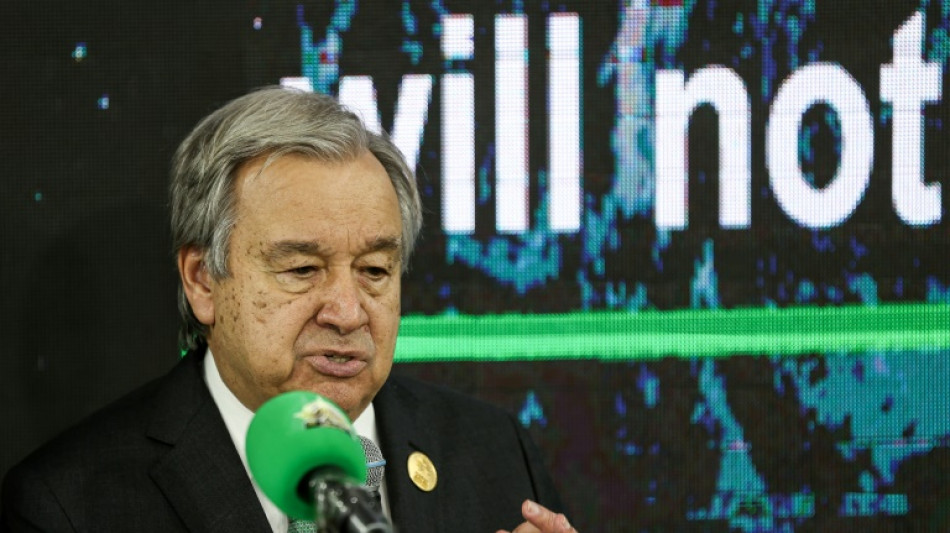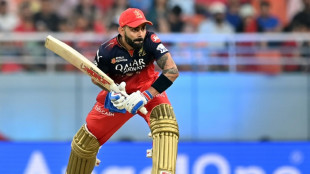
-
 Leaders Inter level with Napoli after falling to late Orsolini stunner at Bologna
Leaders Inter level with Napoli after falling to late Orsolini stunner at Bologna
-
David rediscovers teeth as Chevalier loses some in nervy Lille win

-
 Piastri wins Saudi Arabian Grand Prix, Verstappen second
Piastri wins Saudi Arabian Grand Prix, Verstappen second
-
Kohli, Rohit star as Bengaluru and Mumbai win in IPL

-
 Guirassy helps Dortmund past Gladbach, putting top-four in sight
Guirassy helps Dortmund past Gladbach, putting top-four in sight
-
Alexander-Arnold lauds 'special' Liverpool moments

-
 Pina strikes twice as Barca rout Chelsea in Champions League semi
Pina strikes twice as Barca rout Chelsea in Champions League semi
-
Rohit, Suryakumar on song as Mumbai hammer Chennai in IPL

-
 Dortmund beat Gladbach to keep top-four hopes alive
Dortmund beat Gladbach to keep top-four hopes alive
-
Leicester relegated from the Premier League as Liverpool close in on title

-
 Alexander-Arnold fires Liverpool to brink of title, Leicester relegated
Alexander-Arnold fires Liverpool to brink of title, Leicester relegated
-
Maresca leaves celebrations to players after Chelsea sink Fulham

-
 Trump eyes gutting US diplomacy in Africa, cutting soft power: draft plan
Trump eyes gutting US diplomacy in Africa, cutting soft power: draft plan
-
Turkey bans elective C-sections at private medical centres

-
 Lebanon army says 3 troops killed in munitions blast in south
Lebanon army says 3 troops killed in munitions blast in south
-
N.America moviegoers embrace 'Sinners' on Easter weekend

-
 Man Utd 'lack a lot' admits Amorim after Wolves loss
Man Utd 'lack a lot' admits Amorim after Wolves loss
-
Arteta hopes Arsenal star Saka will be fit to face PSG

-
 Ukrainian troops celebrate Easter as blasts punctuate Putin's truce
Ukrainian troops celebrate Easter as blasts punctuate Putin's truce
-
Rune defeats Alcaraz to win Barcelona Open

-
 Outsider Skjelmose in Amstel Gold heist ahead of Pogacar and Evenepoel
Outsider Skjelmose in Amstel Gold heist ahead of Pogacar and Evenepoel
-
Arsenal make Liverpool wait for title party, Chelsea beat Fulham

-
 Trump slams 'weak' judges as deportation row intensifies
Trump slams 'weak' judges as deportation row intensifies
-
Arsenal stroll makes Liverpool wait for title as Ipswich face relegation

-
 Sabalenka to face Ostapenko in Stuttgart final
Sabalenka to face Ostapenko in Stuttgart final
-
Kohli, Padikkal guide Bengaluru to revenge win over Punjab

-
 US aid cuts strain response to health crises worldwide: WHO
US aid cuts strain response to health crises worldwide: WHO
-
Birthday boy Zverev roars back to form with Munich win

-
 Ostapenko eases past Alexandrova into Stuttgart final
Ostapenko eases past Alexandrova into Stuttgart final
-
Zimbabwe on top in first Test after Bangladesh out for 191

-
 De Bruyne 'surprised' over Man City exit
De Bruyne 'surprised' over Man City exit
-
Frail Pope Francis takes to popemobile to greet Easter crowd

-
 Lewandowski injury confirmed in blow to Barca quadruple bid
Lewandowski injury confirmed in blow to Barca quadruple bid
-
Russia and Ukraine accuse each other of breaching Easter truce

-
 Zimbabwe bowl Bangladesh out for 191 in first Test in Sylhet
Zimbabwe bowl Bangladesh out for 191 in first Test in Sylhet
-
Ukrainians voice scepticism on Easter truce

-
 Pope wishes 'Happy Easter' to faithful in appearance at St Peter's Square
Pope wishes 'Happy Easter' to faithful in appearance at St Peter's Square
-
Sri Lanka police probe photo of Buddha tooth relic

-
 Home hero Wu wows Shanghai crowds by charging to China Open win
Home hero Wu wows Shanghai crowds by charging to China Open win
-
Less Soviet, more inspiring: Kyrgyzstan seeks new anthem

-
 Defending champion Kyren Wilson crashes out in first round of World Snooker Championship
Defending champion Kyren Wilson crashes out in first round of World Snooker Championship
-
NASA's oldest active astronaut returns to Earth on 70th birthday

-
 Exec linked to Bangkok building collapse arrested
Exec linked to Bangkok building collapse arrested
-
Zelensky says Russian attacks ongoing despite Putin's Easter truce

-
 Vaibhav Suryavanshi: the 14-year-old whose IPL dream came true
Vaibhav Suryavanshi: the 14-year-old whose IPL dream came true
-
Six drowning deaths as huge waves hit Australian coast

-
 Ukrainian soldiers' lovers kept waiting as war drags on
Ukrainian soldiers' lovers kept waiting as war drags on
-
T'Wolves dominate Lakers, Nuggets edge Clippers as NBA playoffs start

-
 Taxes on super rich and tech giants stall under Trump
Taxes on super rich and tech giants stall under Trump
-
Star Wars series 'Andor' back for final season


UN unveils global 'early warning' system for disasters at $3 billion
The United Nations on Monday unveiled a five-year plan to build a global early warning system for deadly and costly extreme weather events amplified by climate change.
The price tag -- a relatively modest $3.1 billion, or less than 50 cents per person -- is a small price to pay for proven methods that can save thousands, if not millions, of lives, UN chief Antonio Guterres said at the COP27 climate summit in Egypt.
"I have called for every person on Earth to be protected by early warning systems within five years, with the priority to support the most vulnerable first," he said as world leaders gathered in the Red Sea resort of Sharm el-Sheikh for the 13-day talks.
Even as climate-enhanced extreme weather is multiplying, half the world's countries lack advanced early warning systems that can save lives.
Countries with inadequate infrastructure see, on average, eight times greater mortality from disasters than countries with strong measures in place, according to the UN.
Proper early warning systems for floods, droughts, heatwaves, cyclones or other disasters allow for planning that minimises adverse impacts.
And it works: the number of people affected by disasters has nearly doubled over the last two decades, but the number of people killed or missing has fallen by half.
When Cyclone Bhola hit what is present-day Bangladesh in 1970, it claimed hundreds of thousands of lives, prompting the country founded the following year to invest in weather forecasting technology, shelters and a network of volunteers along the coast.
A similarly strong Cyclone Amphan made landfall in 2020 in the same area, but left a death toll of just 26.
"Early warnings save lives and provide vast economic benefits," World Meteorological Organization chief Petteri Taalas said in a statement.
"Just 24 hours notice of an impending hazardous event can cut the ensuing damage by 30 percent."
The Global Commission on Adaptation found that spending just $800 million on such systems in developing countries would avoid losses of $3 billion to $16 billion per year.
Starting with science-based observation networks and forecasting technology, a complete early warning infrastructure also requires national and community-based response capabilities, along with ways to rapidly communicate information to a population.
A.Mahlangu--AMWN